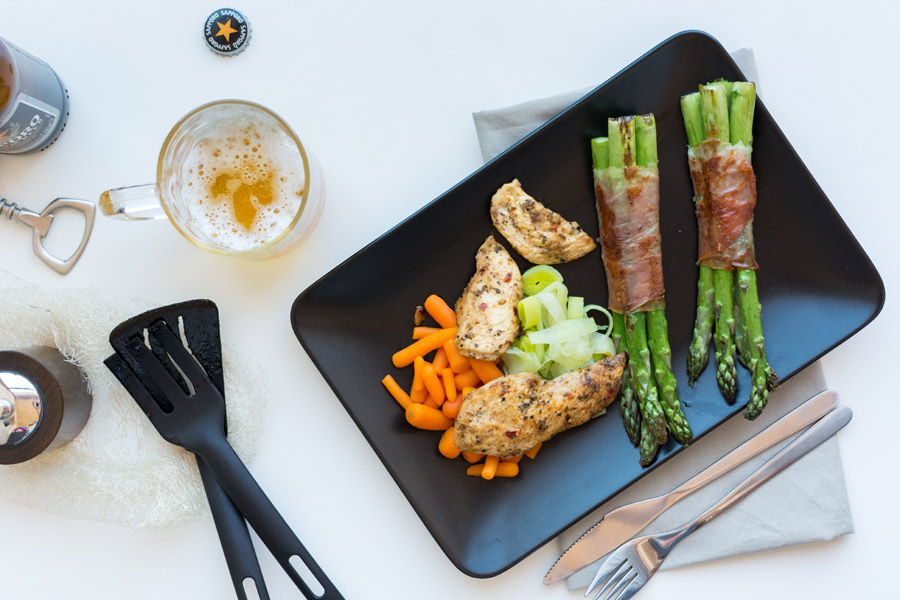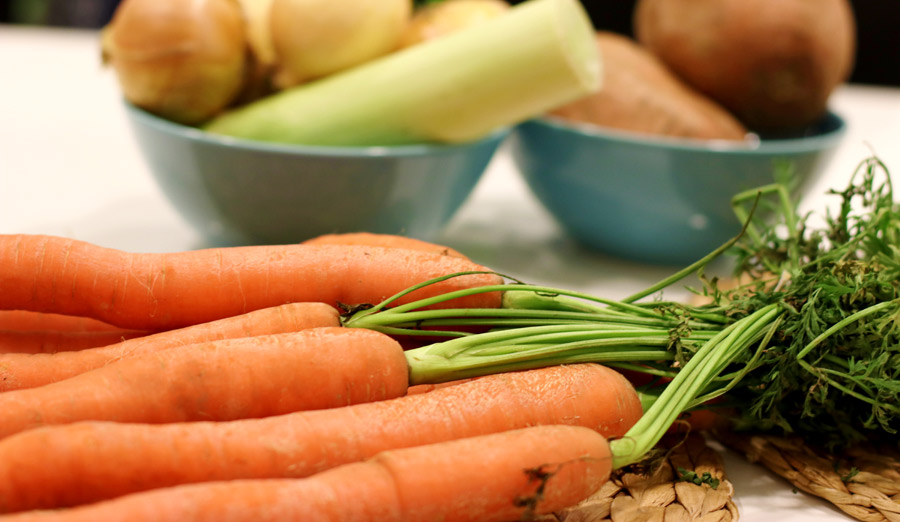February is American Heart Month, a time to focus on heart health
Let’s talk about how to create a heart healthy diet we enjoy — eating foods that are good for our hearts, satisfy our taste buds, and are easy to make.
Why now? Heart diseases remain the leading cause of death for both men and women in the United States. To raise awareness about these diseases, it’s essential to learn more about how you can protect your heart health naturally.
Quick Links → What is HD? | Tips | Food Lists | Meal Ideas | Recipe

Before we get to the foods that make our hearts rejoice, we need to understand this: coronary heart disease, cardiovascular disease, and heart disease are not the same thing. It’s so important to understand what heart disease is, as well as its different forms. Let’s get started…
What is Coronary heart disease?
Coronary heart disease occurs when one or more of the heart’s blood vessels become blocked or narrowed. This can lead to a heart attack.
What is Cardiovascular disease?
Cardiovascular disease is an umbrella term that refers to any heart condition that affects the heart muscle, heart valves, and more. It also includes diseases of other parts of the circulatory system, such as stroke and high blood pressure.
What is Heart disease?
Heart disease is a general term for any type of heart abnormality or disorder.
So, how can you protect your heart health naturally?
You can protect your heart naturally by making simple lifestyle changes, starting with your diet, but lifestyle changes are important, too.
- Eat a balanced diet with plenty of fruits and vegetables is key.
- Do regular exercise helps reduce stress levels and lower your risk for heart disease.
- Get enough sleep – seven to eight hours per night is recommended for optimal heart health.
- If you smoke, now is the time to quit – smoking increases your risk for heart disease and other health problems.
What is a Heart Healthy Diet?
One of the best ways to improve heart health and reduce the risk of heart disease is through our diets.
Eating heart-healthy foods that are low in saturated fat, salt, and sugar can help lower cholesterol levels and reduce blood pressure.
Briefly, incorporating more fruits, vegetables, whole grains, lean proteins, heart-healthy fats like olive oil or nuts in your diet can also help keep your heart healthy. (More on this later.)
Heart Healthy Diet Tips
Including Omega-3 Fatty Acids
In addition to cutting back on unhealthy foods, there are other dietary changes that you can make to further protect your heart health.
For instance, omega-3 fatty acids are essential for proper heart functioning and can be found in fatty fish like salmon or tuna. Eating omega-3s helps promote good heart health and reduces the risk of heart disease. Omega-3s may also help lower cholesterol levels by reducing inflammation in the body.
Adding Fiber
Additionally, Fiber is an important part of a heart-healthy diet. Soluble fibers such as oats, beans, peas, lentils and apples help reduce cholesterol levels in the blood which helps keep your arteries healthy and lowers your risk for heart disease. Fiber also helps you feel fuller longer which makes it easier to maintain a healthy weight – another important factor for heart health!
Limiting alcohol
Limiting alcohol consumption is also key for improving heart health. Drinking too much alcohol can increase blood pressure and triglyceride levels – two factors that contribute to heart disease. If you do choose to drink alcohol, limit yourself to one drink per day for women or two drinks per day for men and always drink responsibly.
A frequently asked question is why the amount of alcohol is different for men and women, so let’s briefly answer that…
Basically, the recommended amount of alcohol varies between men and women because men typically have a higher tolerance for alcohol due to differences in body size and composition.
Women also metabolize alcohol differently, leading to a greater risk of heart-related health problems if they instead consume the same amount as men. That is why it’s important for women to limit their intake to one drink per day in order to maintain heart health.
Eating smaller meals
Another key point is eating smaller meals throughout the day instead of larger meals at one time is another way to maintain a healthy weight and reduce the risk of developing other illnesses like diabetes which can contribute to poor heart health. Smaller meals keep your energy levels up throughout the day without overloading your body with too many calories all at once!
By following these simple steps – eating a balanced diet with plenty of fruits and vegetables; adding omega-3 fatty acids; increasing fiber intake; limiting alcohol consumption; and eating smaller meals more frequently – we can improve our heart health significantly this American Heart Month and beyond!
When it comes to heart health, certainly the best foods to include in your diet are those that are heart-healthy and low in saturated fat, salt, and sugar. Eating heart-healthy foods, limiting alcohol consumption and eating smaller meals more frequently are all great ways to protect your heart health.
Exercising
Of course, right? Exercise is an important part of heart health and can help reduce the risk of heart disease. Regular physical activity strengthens your heart, improves circulation, lowers blood pressure and decreases stress levels. Aim for at least 30 minutes of moderate-intensity exercise 5 to 7 days per week.
Walking is one of the most heart-healthy exercises out there, making it an ideal choice for those looking to improve heart health. Not only is it relatively easy and low-impact, but it also has a range of heart health benefits.
Heart Healthy Diet – Food Lists

Top Heart Healthy Vegetables:
- Spinach
- Broccoli
- Carrots
- Bell peppers
- Asparagus
- Kale
- Sweet potatoes
Top Heart Healthy Fruits:
- Apples
- Oranges/Clementine
- Blueberries
- Strawberries
- Avocados
- Bananas
Top Heart Healthy Meats:
- Salmon
- Tuna
- Oily fish (sardines, mackerel)
- Lean poultry (chicken and turkey)
- Boneless, skinless breasts
Top Heart Healthy Nuts & Seeds
- Almonds
- Walnuts
- Flaxseed
Top Heart Healthy Snacks :
- Dark chocolate
- Air popped popcorn (without flavorings)
- Trail mixes with nuts and dried fruits
Heart Healthy Diet – Meal Ideas
– Dinner: A heart-healthy dinner could include a hearty salad made with heart-healthy ingredients like dark, leafy greens, tomatoes, bell peppers, nuts and seeds, lean protein like salmon or tuna and heart-healthy fats like olive oil or avocado.
On the side, you could have a small serving of whole grain, such as brown rice, quinoa or barley. For dessert, opt for heart-healthy snacks such as dark chocolate
– Lunch: A heart-healthy lunch could include a delicious and nutritious salad made with heart-healthy ingredients such as dark leafy greens like spinach, arugula, kale or romaine; heart-healthy proteins like chicken, salmon or tuna; heart-healthy fats like olive oil and avocado; and heart-healthy carbohydrates like whole grains and legumes.
On the side, or for a mid-afternoon pick-me-up, you could have heart-healthy snacks such as trail mixes with nuts and dried fruits or air-popped popcorn.
– Breakfast: A heart-healthy breakfast could include something like oatmeal with nuts and dried fruit, topped with a dollop of plain Greek yogurt. Oatmeal is a whole grain that is packed with heart-healthy fiber, which helps to regulate cholesterol levels in the blood, reduce inflammation and stabilize blood sugar levels. The nuts and dried fruits provide heart-healthy fats, while the yogurt adds heart-healthy protein and calcium.
By eating heart-healthy meals throughout the day, you can help keep your heart in top condition this American Heart Month and every month!

Heart Healthy Diet – Oven Roasted Veggies Recipe
Oven roasted vegetables are a heart-healthy and delicious way to enjoy your favorite veggies.
Roasting veggies in the oven brings out their natural sweetness, while also preserving their heart-healthy nutrition. Here’s how to make heart-healthy oven roasted vegetables that the whole family can enjoy.
Ingredients:
- 2 cups of heart-healthy vegetables, like:
- bell peppers (red, yellow, green)
- carrots
- broccoli and/or brussels sprouts
- asparagus
- sweet potatoes or white potatoes*
- 1 tablespoon of heart-healthy oil such as olive or avocado oil
- Salt and pepper to taste
* Both white and sweet potatoes have similar amounts of calories, protein, and carbohydrates. The difference is that white potatoes have more potassium and sweet potatoes have a lot of vitamin A.
Instructions:
1. Preheat oven to 375° F
2. Cut heart-healthy vegetables into cubes or slices and place them onto a greased baking sheet according to cooking times**
3. Drizzle heart-healthy oil over the veggies and season with salt and pepper, to taste
4. Roast in preheated oven for 25-30 minutes, stirring halfway through
5. Serve heart-healthy roasted vegetables with your favorite heart-healthy protein and enjoy!
** See the list of cooking times for vegetables here.
Oven roasted vegetables are an easy and delicious way to get heart-healthy nutrients into your diet this American Heart Month and every month.
Enjoy!
